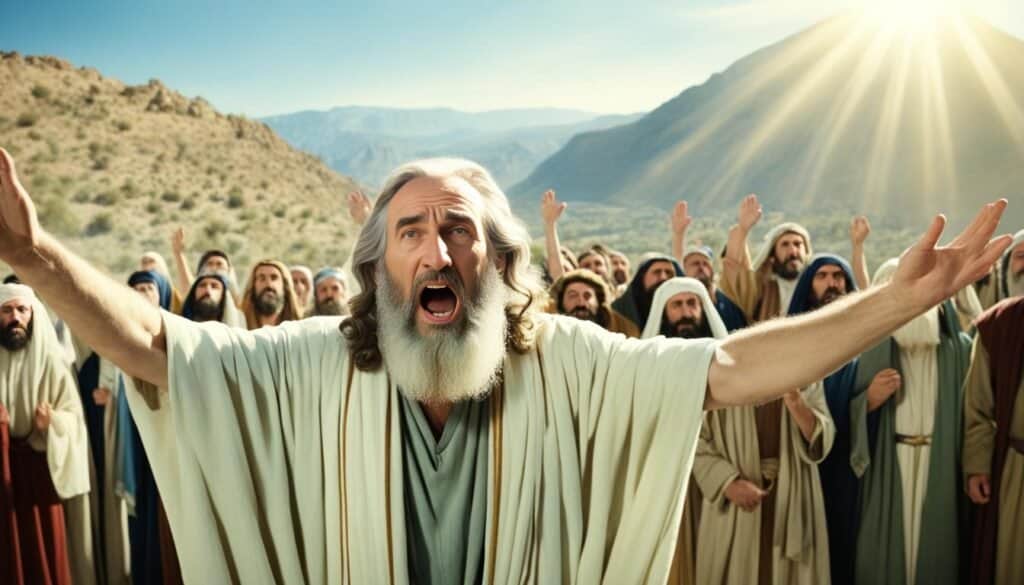Welcome to our journey into exploring meekness, with Moses as our guide. Moses is known as one of history’s best leaders and God’s faithful worker. But what was his secret? How did Moses lead with strength and humility?
This article will shed light on Moses’ life. It will explain how his meekness affected his leadership and connection with God. We’ll see how being meek and humble can make us better leaders, too.
Key Takeaways:
- Explore how Moses’ meekness shaped his leadership style
- Understand the importance of humility in cultivating a closer relationship with God
- Learn valuable lessons on applying meekness and humility in our own lives
- Discover how meekness can transform challenges into opportunities for growth
- Unravel the role of meekness in confronting opposition with grace and wisdom
Moses’ Meekness – A Biblical Perspective
In Numbers 12:3, the Bible calls Moses the meekest man on earth. This makes him a great example of meekness. Meekness is a quality not often praised; we usually value more assertive traits. But Moses showed us that being humble was key to his success as a leader.
“Now Moses was a very humble man, more humble than anyone else on the face of the earth.” – Numbers 12:3
Moses led with both gentleness and wisdom thanks to his humility. It’s important to know that meekness is not the same as being weak. Moses’ gentle strength let him stand against powerful leaders, lead his people through hard times, and follow God unwaveringly.
Moses knew he was limited but trusted in God fully. He led his people with respect for God’s commands. This trust and obedience in God are what showed his true strength.
Moses faced many challenges and complaints from his people. But he always stayed humble, never letting anger or pride cloud his judgment. Instead, he pointed his people towards God and prayed for God’s help.
Moses also had close, humble talks with God. He showed deep respect and always sought to understand God’s will. This shows that true strength comes from aligning our will with God’s.
This image shows Moses bowing before God, displaying his deep humility and respect.
In the end, Moses’ story teaches us a lot. It shows how true strength comes from humility and trusting God. By being meek, we can have a stronger faith, lead wisely, and handle tough times and criticism with grace.
Responding to Criticism with Meekness
Moses was known for his humble reactions to criticism. He didn’t get defensive or upset. Instead, Moses showed meekness. He shifted attention to God when criticized.
In Exodus 16:8, complaints about food in the desert arose. Moses told the Israelites it wasn’t about him. He said their grumbling was against the Lord.
“Moses told them, ‘In the evening the Lord will give you meat to eat, and in the morning bread to satisfy your hunger because he has heard your complaints. You are not grumbling against us, but against the Lord.'”
This response reveals Moses’ view of leadership and his trust in God. He didn’t defend himself or look for praise. Instead, he urged the Israelites to trust God’s promises.
Moses teaches us to handle criticism with meekness and humility. It’s easy to want to defend ourselves. But meekness asks for a gentler reply.
Choosing to respond gently and humbly can lead to understanding. Meekness helps us put ego aside and focus on building understanding with others.
When criticized, think of Moses and his humble ways. Instead of feeling attacked, reflect on the critique. Aim to understand and see where you can improve. This humble response shows maturity and helps relationships grow.
Now, let’s see how Moses’ meekness influenced his prayers for the Israelites. It shows his deep love for God’s people. But first, let’s look deeper into the importance of Moses’ humbleness from the Bible’s view.
Interceding for Others with Meekness
Moses was incredibly humble. He showed meekness by praying for the Israelites in Exodus 32:11. He asked God to forgive them. These prayers are a great example of how meekness impacts our prayers, helping us show humility when we pray for others.
“Oh LORD,” Moses interceding for the Israelites pleads, “why does your anger burn against Your people whom You have brought out of Egypt with great power and a mighty hand?” (Exodus 32:11)
Moses showed deep love and concern for the Israelites, even though they were rebellious. His humility put their needs first. Through his prayers, he sought God’s mercy for them. This shows the strength of humble prayers.
Humble Prayers: A Reflection of Meekness
When we intercede with meekness, we mirror Moses’s heart. We put the well-being of others above our own. Meekness helps us pray with real care and understanding. It invites us to come to God humbly, knowing we depend on Him.
We can learn from Moses by asking for God’s mercy and compassion in our prayers. Like Moses prayed for the Israelites, we can pray for our loved ones and others. Humble prayers can bring big changes in our spiritual lives.
Choosing meekness in our prayers connects us to God’s wish for mercy and unity. Praying humbly bridges the gap between God and the people we pray for. This can lead to unity, healing, and change.

Meekness and Obedience
Moses showed great obedience to God, proving his strong meekness. In Exodus 40:16, we see Moses follow God’s orders completely. This shows how meekness and obedience work well together. Learning from Moses, we understand how meekness helps us obey better in our lives.
Moses wasn’t afraid or forced to obey God. He wanted to follow God and did so with humility. Moses knew he wasn’t as wise as God. Surrendering himself fully to God, he led the Israelites well, guiding them to the Promised Land.
Meekness and obedience help each other grow. Meekness brings the humility needed to truly hear God. It lets us accept God’s plans over our own without a fight. Through meekness, we learn our thoughts are small compared to what God knows.
Meekness, an Essential Component of Obedience
Moses obeyed not because he had to but because he chose to follow God’s will. This included hard times and unclear paths. His meekness-led obedience helped him and the Israelites get through the wilderness as he stuck to God’s plan.
“Moses’ complete surrender to God’s commands exemplifies the perfect harmony between meekness and obedience.”
We all face hard choices when it comes to obeying God. But Moses’s story teaches us to seek meekness. Meekness helps us want God’s will over our own. It helps us trust that God’s plan is always best.
| Benefits of Meekness and Obedience | How Meekness Enhances Obedience |
|---|---|
| 1. Deepens our relationship with God | 1. Helps us to surrender our will to God’s |
| 2. Helps us to discern God’s will | 2. Enables us to trust God’s guidance |
| 3. Strengthens our faith | 3. Equips us to overcome obstacles and challenges |
| 4. Influences our character and leadership | 4. Inspires others to follow God’s commands |
By working on meekness, we open ourselves to obey God more. With meekness, our hearts turn to what God wants. Like Moses, we can find a full life by following God completely.
Leading with Meekness
Moses had an amazing closeness to God in his life. In Deuteronomy 34:10, this special bond is highlighted. His meek and humble heart played a big part. Through Moses, we learn that meekness can deepen our connection with God.
Being meek helped Moses lead the Israelites wisely and with care. Despite his power, he kept pride and ego in check for God. He used humility and meekness to make good choices. This approach made people love him more and brought him closer to God.
Moses’ meek state showed how much he trusted God. He used God’s wisdom and power to lead. This made him a confident leader, always feeling God’s presence. We can lead better if we follow Moses’ example of meekness, finding peace and guidance in our roles.
“The meekness to truly submit to God is essential to successful leadership. It is not about weakness, but rather a surrender of our pride and egos, allowing us to be vessels for God’s will.” – Moses
Moses’ meekness affected how he spoke to God and the people. He came to God with honor, looking for His guidance in every step. This helped him get and pass on God’s message clearly and purely. We should talk to God and others like Moses did, with meekness that brings understanding and humility.
Through his consistent meekness, Moses led the Israelites and grew his own faith in God. He knew that real leadership is about following God’s will. Meekness is the way to a rich and personal relationship with Him.
| Leading with Meekness | |
|---|---|
| Meekness in Leadership | Moses’ meekness guided his actions and decisions, allowing him to lead the Israelites with wisdom and compassion. |
| Trusting God’s Guidance | Moses’ meekness demonstrated his trust in God’s guidance and provision, leading to a closer connection with Him. |
| Effective Communication | Moses’ meekness influenced his communication with God and the people, fostering understanding and humility. |
| Strengthening Faith | Moses’ meekness strengthened his own faith and belief in God’s plan, exemplifying the importance of surrendering to His will. |
By copying Moses’ meekness, we can be great leaders with a close bond with God.

Meekness in Difficult Situations
Moses was known for being meek, helping the Israelites during hard times. In Exodus 14:13, he tells them not to fear, encouraging them to wait for God’s help. His message was clear: trust in God and you will be saved today.
This shows how much Moses believed in God’s care and help. His meekness mixed humility, faith, and bravery perfectly.
“Do not be afraid. Stand firm and you will see the deliverance the Lord will bring you today.”
Moses trusted God fully, even when danger was near. His meekness showed the Israelites how to have faith and courage. This faith and courage were based on trusting in God’s promises and power.
We can follow Moses’ lead in our own tough times. Being meek means giving our worries to God and knowing He will care for us. Meekness gives strength to face hardships with faith and bravery, since God’s power is greater than all difficulties.
Trusting in God’s Deliverance
Our meekness helps us trust in God’s saving power when times are tough. Like Moses told the Israelites, standing firm lets us see the Lord’s help and feel secure in it.
The image below captures the essence of Moses’ meekness in deliverance:

| Moses’ Meekness in Deliverance |
|---|
| Exodus 14:13 |
| Moses encourages the Israelites to trust in God’s deliverance despite the intimidating circumstances. |
Receiving and Communicating God’s Word with Meekness
Meekness is a crucial virtue in our faith journey. It helps us both receive and share God’s word humbly. A shining example of meekness is seen in Moses’ life. In Exodus 34:28, Moses spent forty days with God, learning the laws for the Israelites.
Moses’ meekness showed strength, not weakness. It allowed him to fully trust in God’s plan. His humility let him truly grasp God’s laws, essential for the Israelites’ faith.
Moses used his meekness to talk to the people about God’s laws. He knew being gentle and patient was key. This way, the laws were shared with love and understanding.
Following Moses’ example shows us how important humility is. It makes sharing God’s truth easier. Meekness sets the stage for meaningful discussions about God.
The Role of Meekness in Our Lives
Meekness helps us welcome God’s teachings without pride. It makes us eager to learn from the Bible. With meekness, the Bible’s message becomes clear and meaningful to us.
Also, meekness helps us talk about God with love and grace. It creates a space where wisdom is accepted. Discussing faith gently leads to better understanding.

Practicing Meekness
To be meek, we must give up our own ideas and listen. It’s about being gentle and respectful when we talk about God. Here are some ways to practice meekness:
- Stay humble and open-minded when studying Scripture.
- Approach discussions about faith with a spirit of meekness and understanding.
- Speak truth in love, considering the feelings and perspectives of others.
Meekness is not weak; it’s choosing to follow God’s plan actively. It helps us draw closer to God and share His word effectively.
| Benefits of Meekness in Receiving and Communicating God’s Word |
|---|
| Enhanced understanding and discernment of Scripture |
| Fostering an atmosphere of receptiveness and receptivity |
| Effective communication of God’s truth with love and clarity |
| Deeper connection and alignment with God’s will |
Meekness in the Face of Rebellion
Moses was very humble, even when many people rebelled against him. In Numbers 14:5, Moses and Aaron fell down before the people, asking God to help with deep respect.
Moses’ calm attitude during tough times teaches us a valuable lesson. He didn’t get mad or try to pay back those who hurt him. Instead, he stayed humble before God and the people. Moses shows us the strength of staying gentle in hard times.
“My Lord, I pray You, let the power of the Lord be great, just as You have declared, ‘The Lord is slow to anger and abundant in lovingkindness, forgiving iniquity and transgression; but He will by no means clear the guilty, visiting the iniquity of the fathers on the children… third and the fourth generations.’ Pardon, I pray, the iniquity of this people according to the greatness of Your lovingkindness, just as You also have forgiven this people, from Egypt even until now.“
– Moses, Numbers 14:17-19
Moses showed us it’s important to ask God for help with respect. Instead of just relying on himself, Moses asked for God’s strength. He knew God’s forgiveness and kindness were endless.
We should follow Moses’ example when we face hard times. Staying humble and asking God for help can transform tough situations. It can turn them into chances for us and others to grow and heal.
The Blessings of Meekness
Choosing meekness in tough times strengthens our bond with God. It also helps bring people together and find peace, like it did with the Israelites. Moses’ gentle response helped his people realize their mistakes and feel sorry for them.
Moses’ humble request changed his people’s future. He led them to a better place, showing us meekness’ power today.
| Benefits of Meekness in the Face of Rebellion | Examples of Meekness |
|---|---|
| Promotes reconciliation and unity | Moses falling on his face before the assembly (Numbers 14:5) |
| Invites God’s intervention and guidance | Moses seeking God’s forgiveness and mercy for the people (Numbers 14:17-19) |
| Transforms conflict into growth and restoration | Moses leading the Israelites towards the promised land despite their rebellion |
By following Moses’ example, we can bring kindness, humbleness, and forgiveness when faced with hostility. Remember, seeking God’s help with gentleness can change the world. We can help heal and bring people together in a world that needs it.
Teaching Others with Meekness
Let’s look at how Moses taught with meekness. He knew sharing knowledge was key. Moses made sure everyone understood and followed God’s laws.
Moses’ method of teaching is summed up in Deuteronomy 6:6-7:
Put these words in your heart. Teach them carefully to your kids. Talk about them at home or on the road, when you wake or go to sleep.
Moses didn’t just teach in classrooms. He showed the Israelites how to live God’s laws every day. This way, he truly connected with them.
He used gentleness and patience in his teaching. This made the Israelites feel cared for. They were more open to following God because of Moses’ kindness.
Moses’ approach to teaching can teach us a lot. Whether we teach in school, at home, or in our community, we should learn from Moses:
- Lead by being an example of meekness.
- Create a safe place for learning, where everyone feels valued.
- Be patient since everyone learns differently.
- Build personal connections with those you teach.
- Show how to use what they learn in real life.
Using these methods in our teaching will make a big impact. Like Moses inspired many, we too can share knowledge with love and humbleness.
Key Points:
- Moses ensured people would follow God’s laws by teaching with meekness.
- Moses’ teaching style included making God’s words part of daily life.
- He taught by example, created a caring space, was patient and understanding, built personal connections, and focused on using lessons practically.
- These meekness principles can help us become better teachers and truly make a difference.
How Does the Meekness of Moses Exemplify the Concept of the Meek Inheriting the Earth?
Moses’ meekness shines through in his patience, humility, and obedience to God’s will, despite leading a vast nation. His ability to lead without arrogance served as a powerful example of how the meek inherit earth, showing that true strength lies in submission, wisdom, and faith rather than force.
Balancing Righteous Indignation with Meekness
Moses showed a kind of anger that was right in God’s eyes when the Israelites started worshipping a golden calf. This story is found in Exodus 32:19. When he saw the calf, he broke the stone tablets that had God’s laws on them. Moses’ burning love for God and his people was clear. However, Moses did not act rashly but with a balanced approach.
Moses didn’t just scold the Israelites. He prayed for them, asking for God’s help and mercy. Despite their sin, he came to God with a humble heart, knowing that God’s goodness and power are what really changes hearts. Moses teaches us that true justice is not just about being strong. It’s also about wanting to see things made right through healing and forgiveness.
Moses teaches us to blend wrath with humility. Meekness is power that’s in check. It helps us call out wrong things with gentleness and respect, always looking to God for direction and wisdom. Following Moses’ example, we approach wrongdoing with firmness, yet with a focus on peace and making things right.
Let Moses’ story push us to deal with evil in the world with both right anger and meek spirits. This way, we stand by God’s rules while helping to make space for change, forgiveness, and unity.
Affiliate Disclosure: "As an Amazon Associate I earn from qualifying purchases made from links in this post. We are a participant in the Amazon Services LLC Associates Program, an affiliate advertising program designed to provide a means for us to earn fees by linking to Amazon.com."

